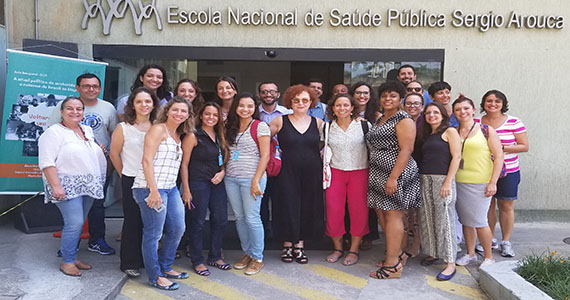Dornsife Professor's "Place and Health" Course in Brazil Adds to Growing Collaborations with Latin America

Dr Sharrelle Barber, (front, second from right), with her course participants at the Oswalado Cruz Foundation.
March 22, 2018
By: Adriana Lein
What started out as a single journal article on racism and health inequalities paved the way for an international short-course exploring linkages between place, race, and health in Rio de Janeiro for Dornsife Assistant Researcher Professor Sharrelle Barber, ScD. The intensive course spanned one week of the Brazilian summer semester and provided an opportunity for critical thinking and analyses of place-based and interrelated social determinants of health. Specifically, the course explored issues of race and racism and neighborhood segregation and how these intersect with other social and political structures to shape health and inequalities in health. Many aspects of Brazil’s past and present make it an important setting to study health though a lens of race and place.
Unlike the U.S., racial segregation and discrimination were never enforced through official laws in Brazil; however informal agreements between property owners, employers, and others in positions of power were widespread to exclude people of color. The North and Northeastern regions of the country where industries used slave labor have persistently higher poverty and underdevelopment compared to other regions. Around the turn of the 20th century, a policy of branqueamento (whitening) was widely promoted, encouraging interracial relationships to construct an image of Brazil as a “white” country on the global stage. Today, people identifying as Afro-Brazilian or mixed race make up a majority of the population. Yet, they face disproportionately higher poverty and continue to be disadvantaged in main sectors such as education, employment, housing, and health care.
Dr. Barber’s course titled “Place and Health: Methodological Approaches to Examining Macrosocial Determinants of Population Health” took place during the Brazilian summer semester from February 26-March 2 at the Oswaldo Cruz Foundation (Fiocruz). Fiocruz is a leading public health institution in Latin America and the research arm and university of the Brazilian Ministry of Health. According to Dr. Barber, the idea for the summer course developed from existing research collaborations with Letícia Cardoso, PhD and Dóra Chor, PhD both researchers at Fiocruz. Dr. Cardoso was previously a Dornsife visiting scholar and is part of the team overseeing the Brazilian Longitudinal Study of Adult Health (ESLSA-Brasil). Dr. Chor is the former principle investigator of the ESLA-Brasil site in Rio de Janeiro and an epidemiologist who has worked extensively with racism and social determinants of health in Brazil. They were instrumental in assisting with the overall development of the course and its coordination and execution.
The summer course brought together graduate students, postdocs, and researchers from Fiocruz, other institutions in Brazil, and even Argentina. Dr. Barber structured the course to provide participants with both a historical and conceptual foundation with social theories and the methodological tools to apply what was learned to their own research and projects in the future. Adding value to the course was the range of backgrounds and disciplinary perspectives of its participants. On the first day, an urban sociologist, Dr. Ana Paula Soares Carvalho, joined the group to share insights on connections between spatial and rational inequalities in Brazil’s favelas, informal hillside communities. For many participants, the course was one of their first opportunities to approach health through a social framework and the results were eye-opening. Dr. Barber explains that in Brazil, “you see social inequality in patterns where people live and race and the structures that have kept black people down. Saying that in the context of a school of public health can make people think differently about their own research. The recent tragic assassination of city councilor Marielle Franco, a Black LGBTQ woman whose political activism denounced police brutality and the denial of basic human rights, make this kind of critical analysis of racism, economic inequality and health even more pertinent.”
Dr. Barber’s course is among the latest in Dornsife’s collaborations with institutions in Latin America. Since 2017, the Salud Urbana en América Latina (SALURBAL) project has been working to examine the impacts of urban environments and policies on health in cities throughout Latin America. SALURBAL is partnering with ten Latin American institutions, including Fiocruz, in addition to two U.S.-based partners and international organizations. These international exchanges for public health research, scholarship, and practice underscore the value of cross-cultural and cross-disciplinary exchanges and dialogue. Dr. Barber’s course participants “were challenged on their own preconceived notions and started to build a team.” As is often the case when bringing together researchers from different countries and backgrounds, the many conversations and ideas shared throughout the course will likely spark new projects and opportunities in the future.